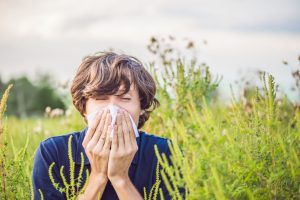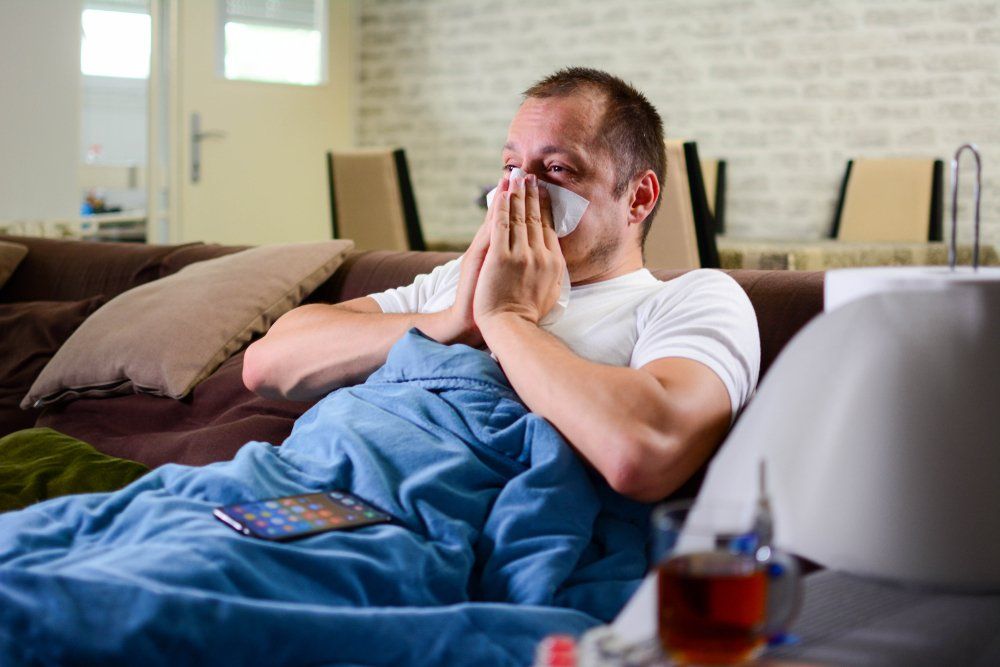Allergies and sinusitis can manifest in similar ways, but they are treated differently. As a result, it’s important to identify the differences between the two conditions. (Learn More: Differences Between Allergies and Sinusitis)
Some kinds of allergies cause you to have a runny nose and sneeze often. (Learn More: What Symptoms Do Sinusitis and Allergies Have in Common?)
This resembles the symptoms of other ailments, such as the common cold or sinusitis. Thankfully, there are ways to tell them apart. Sinusitis in an infection, so it is often accompanied by yellow or greenish mucus. It also involves headaches and pain in the sinus cavity. There are various medications that can effectively treat both allergies and sinusitis. (Learn More: How Each Condition Is Treated)
Overview of Sinusitis
Sinusitis, also called a sinus infection or acute sinusitis, occurs when your sinuses (inner part of your nose) swells and become inflamed. The swelling in your nasal passages may make breathing more difficult.
This swelling and irritation may cause mucus to build up. Sinusitis often occurs during or after a common cold. You may also feel other symptoms like the following:
- Headaches
- Facial pain
- Swelling in the area around your eyes
- Bad breath
- Congestion that makes it difficult to breathe
- Thick mucus or drainage that is usually yellowish or greenish
- Fever
- Tooth pain
In some cases, you may develop a bacterial infection that makes your acute sinusitis last a few days, but these infections generally go away within a few days. You can develop chronic sinusitis if you have an infection that lasts 12 days or longer.
Sinusitis also has different stages depending on how long you have had it or how often it affects you.
- Acute: less than 4 weeks
- Subacute: 4 to 12 weeks
- Chronic: 12 weeks and beyond
- Recurrent: recurring several times per year
Overview of Allergies
There are several different types of allergies, such as allergies to food, insect bites or stings, chemicals, or airborne items. Allergies caused by airborne substances are often also called seasonal allergies or hay fever because pollen is more common during certain times of the year.

Allergies are caused by a reaction in your immune system when it contacts something your body perceives to be both foreign and bad for you. Food, insect, and chemical allergies often cause symptoms like shock, sudden difficulty breathing, and even tingling.
Seasonal allergies often result in symptoms that are similar to sinusitis.
- Conjunctivitis (red, watery eyes)
- Sneezing
- Congestion
- Nasal drip (runny nose)
Differences Between Allergies and Sinusitis
Since both conditions result in inflammation of the nose, sneezing, and a runny nose, you can confuse one for the other if you do not monitor your health. But there are some differences that can help you determine which health issue is present.
- Cause: An allergy is governed by the way your immune system reacts to allergens like pet dander, dust, pollen, or even dirty mattresses. Sinusitis is caused by an infection affecting your nasal passages.
- Telltale symptoms: Allergies can trigger a feeling of itchiness in your throat or nose and cause you to sneeze often. Sinusitis is associated with headaches, pain in the face, and mucus building. Bad breath, pain in the teeth, and difficulty blowing your nose are also common symptoms.
- Ability to prevent reactions: Allergies are not something you can control. Sometimes your immune system simply will not cooperate, and it will result in hay fever. You can reduce your risk of sinusitis by taking precautions to avoid colds and flus. Drinking enough water, getting enough rest, and getting a flu shot can lessen the likelihood of colds or viruses that normally cause a sinus infection later on.
How Each Condition Is Treated
Despite the symptoms they have in common, you need to be mindful of the treatments used for either sinusitis or allergies.
- Decongestants can treat both sinusitis and allergies. They break up mucus and make it easier for you to breathe.
- Pain medication can treat the pain associated with sinusitis. This can include Aleve, Tylenol, or ibuprofen.
- Antihistamines can treat allergies. They include medication such as Benadryl, Zyrtec, or Claritin. Antihistamines block the action of histamines, which are released after your immune system detects an allergen and decides to fight it, causing the discomfort associated with allergies.
You cannot use antihistamines to properly treat sinusitis.
- Corticosteroids can treat allergic rhinitis. Corticosteroid nasal sprays work by temporarily relieving inflammation in your nose.
Remember to take them only as long as dictated by the instructions. Talk to your doctor if your symptoms do not improve or if they return. Inhalers can also make it easier for you to breathe.
- Home remedies may be the best ways to properly get over sinusitis. Rest is essential to fully recover from colds and infections. You will also need to:
- Drink fluids in the form of broth, water, tea, and juices.
- Breathe in water vapor or using a neti pot to gently clean your nasal passages.
- Take antibiotics if your doctor determines that bacteria has caused your sinusitis.
Frequently Asked Questions
What are the main differences between allergies and sinusitis?
The cause of allergies and sinusitis are fundamentally different. Sinus infections are associated with the common cold, bacterial infections, or the flu.
Seasonal allergies (hay fever) that cause sinusitis-like symptoms are caused by the same immune system reactions that cause eczema and anaphylactic shock in some people.
You can experience either one or both of these conditions. If you have allergies, pay closer attention to your symptoms, so you do not inadvertently rule out a sinus infection.
What do allergies and sinusitis have in common?
Many of the symptoms of allergies from airborne substances, such as pollen, dirt, dust, or mold, are similar to those of sinusitis. In both instances, you can experience congestion, runny nose, and difficulty breathing through your nasal passages.
Are there any medications that treat these conditions?
Yes, plenty of medications can treat your allergies or sinusitis.
You can use decongestants for both allergies and sinusitis to break up mucus and breathe more easily. Antihistamines work effectively to make your allergies easier to live with.
Sinusitis requires a more nuanced approach depending on how long you have had it. Most often, rest, proper nutrition, and hydration are needed. Home remedies, such as breathing in water vapor, can alleviate sinusitis as well. Pain relievers can help you with the headaches, facial and tooth pain, and pressure you may feel if your sinuses are blocked for too long.

In some cases you will also need to take antibiotics if your sinusitis is caused by bacteria. You may develop chronic or recurrent sinusitis, which means you may experience this condition for 12 weeks or longer, or it recurs a few times per year.
References
Allergies. (January 2018). Mayo Clinic.
Choosing an Over-the-Counter Allergy Medication. (March 2019). Harvard Medical School.
Allergy Medications: Know Your Options. (June 2017). Mayo Clinic.
Do You Need Prescription Medications for Allergy Relief? (July 2019). Verywell Health.
Do You Have Allergies or a Sinus Infection? (November 2018). Healthline.
Sinusitis. (October 2016). MedlinePlus.
Acute Sinusitis. (June 2019) Mayo Clinic
Acute Sinusitis: Do Over-the-Counter Treatments Help? (September 2018) Mayo Clinic


